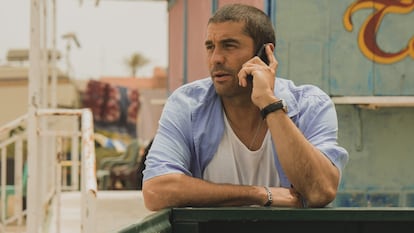The sinister glamorization of narcos
Drug trafficking and use is often glorified and trivialized in pop culture, but even feminists who protest this portrayal ignore how their own drug use fuels human trafficking and the arms trade

Kiko El Cabra (the goat, in English) was given that nickname because he drove fast drug boats very recklessly. But the man who killed two Spanish Civil Guard officers in Barbate (southern Spain) a few weeks ago could also have been dubbed “the goat” because of his ugly face. Still, it wouldn’t be shocking if his story were made into a film starring a handsome actor like Mario Casas. Sito Miñanco looked like a divorced middle-aged man who was always flirting with waitresses half his age, but in the Fariña TV series, he was played by the attractive Javier Rey. In various screen portrayals, Colombian drug kingpin Pablo Escobar had the languid gaze of Wagner Moura or the seductive looks of Benicio del Toro. Underneath the makeup of Griselda is the stunning Sofía Vergara. You can easily recognize her, even when she’s wearing a mask that’s more absurd than the one Jeannette Rodríguez wore in the La dama de rosa TV series to break out of prison. That prison escape was as strange as the one a hitman nicknamed El Pastilla pulled off last December; days later he was captured on camera in Leipzig, Germany (it’s hard to blend in when you look like Jar Jar Binks). But fiction doesn’t care what you really look like. In the movies, this killer would probably be played by Spanish model and actor, Jon Kortajarena, who is reprising his role in the second season of El immortal. In this Spanish TV series (on Movistar Plus+), the gorgeous Álex García plays Juan Carlos Peña, the leader of Los Miami, the gang that controlled drug trafficking in Madrid during the 1990s. It’s the same gang that his mother, actress Ana Obregón, wanted to hire in 2007 to beat up TV presenter Jaime Cantizano for broadcasting unflattering pictures of young Álex. Do a Google search for photos of Juan Carlos Peña and compare them to photos of Álex García to see how much criminals owe casting directors.
The drug trafficker is not only glamorized but also portrayed in a more human light. In a recent EL PAÍS article, Colombian journalist Juan Pablo Calvás denounced such portrayals of narcos after the premiere of Griselda. But this is nothing new. Remember Miguel Ángel Silvestre in Sin tetas no hay paraíso (Without tits there is no paradise, in English)? Countless idiots saw the narco he played as a role model, thinking a criminal’s life is all fancy cars and steamy romances with women who look like Amaia Salamanca. Drug trafficking and use is often glorified and trivialized, but even feminists who protest these portrayals in music, television and movies ignore how their own drug use fuels human trafficking and the arms trade. You don’t have to be investigative journalist Gloria Serra to find the links between the drug trade and human trafficking. However, many people prefer to act like casting directors, as it offers a simpler and more gratifying escape from reality.
Sign up for our weekly newsletter to get more English-language news coverage from EL PAÍS USA Edition
Tu suscripción se está usando en otro dispositivo
¿Quieres añadir otro usuario a tu suscripción?
Si continúas leyendo en este dispositivo, no se podrá leer en el otro.
FlechaTu suscripción se está usando en otro dispositivo y solo puedes acceder a EL PAÍS desde un dispositivo a la vez.
Si quieres compartir tu cuenta, cambia tu suscripción a la modalidad Premium, así podrás añadir otro usuario. Cada uno accederá con su propia cuenta de email, lo que os permitirá personalizar vuestra experiencia en EL PAÍS.
¿Tienes una suscripción de empresa? Accede aquí para contratar más cuentas.
En el caso de no saber quién está usando tu cuenta, te recomendamos cambiar tu contraseña aquí.
Si decides continuar compartiendo tu cuenta, este mensaje se mostrará en tu dispositivo y en el de la otra persona que está usando tu cuenta de forma indefinida, afectando a tu experiencia de lectura. Puedes consultar aquí los términos y condiciones de la suscripción digital.









































